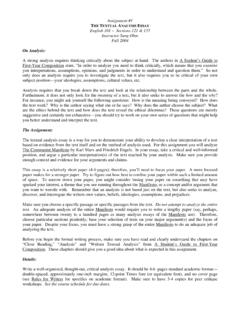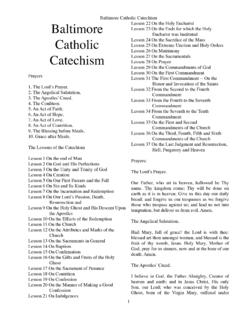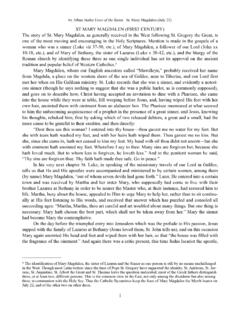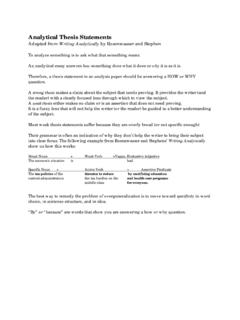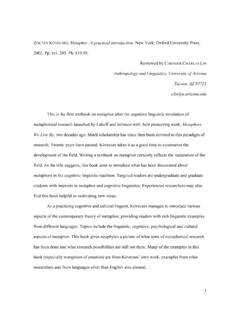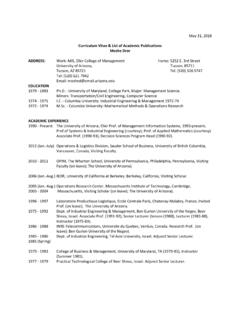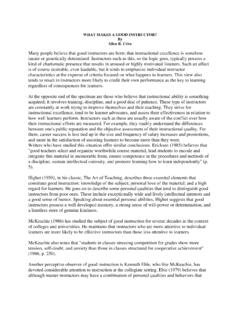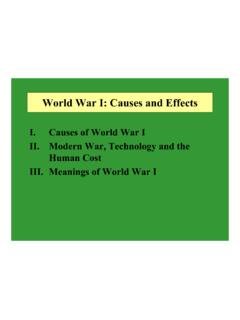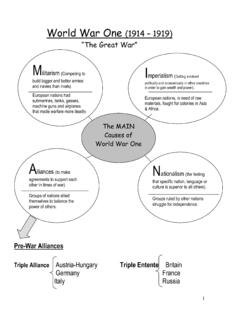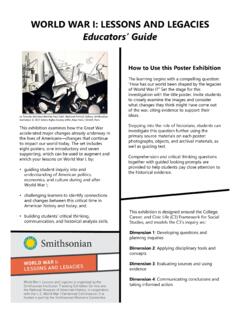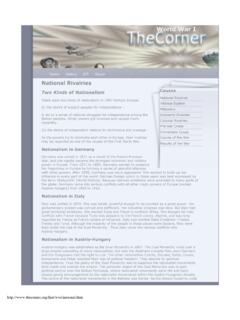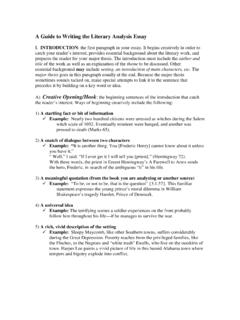Transcription of World War I - Militarism - University of Arizona
1 RivalriesAlliance SystemMilitarismEconomic RivalriesColonial RivalriesPre-war Crises Immediate Cause Course of the WarResults of the WarWorld War IMilitarism Militarism denoted a rise in military expenditure, an increase in military and naval forces, more influence of the military men uponthe policies of the civilian government, and a preference for forceas a solution to problems. Militarism was one of the main causes ofthe First World in military control of the civilian government After 1907, there was an increase in military influence on policy making. This could be reflected particularly in Germany and German Army at this period was called a "State within theState". The parliament and the politicians had to follow the GeneralStaff. They had no say in the army's design to preserve theFatherland. Even though the Schlieffen Plan would incur the angerof Great Britain and bring the latter into a war, it was accepted bythe German civilian government as the war plan.
2 In 1914, the Russian generals were also able to force the Czar to accept fullmobilization. They threatened him with the danger of defeat if heacted raceAfter 1871, the war atmosphere engendered by the secret alliances led to an armaments raceamong the powers. The race was particularly serious between 1900 and 1914, as the internationalsituation became much worse than before. There was a significant rise in the army and navalestimates of the European powers in these in Military Expenditure The Total Defence Expenditure of the Powers (in million )(Germany, Austria-Hungary, Italy, Britain, France and Russia)187018801890190019101914941301542 68289398It is also important to take notice of the fact that from 1910 to 1914, while France increased herdefence expenditure by 10%, Britain by 13%, Russia by 39%, and Germany was the mostmilitaristic as she increased by 73%.
3 Increased war expenditure enabled all the powers to raisemore armies and improve their Rivalry Army conscriptionAll the Continental European powers had adopted the conscription system since 1870. France hadconscription since the Revolutionary Wars, Austria-Hungary since 1868, Germany since 1870, Italysince 1873 and Russia since 1874. Only Britain did not have conscription. After 1890, diplomatic relations among the powers accelerated their military 1913 to July 1914, Germany increased her standing forces by 170,000 men. Francelengthened her period of military service from two to three years. Russia lengthened her term ofservice from three to three and a half years. Britain did not introduce conscription but hadprepared her armed forces for both European expedition and for home defence. In general, all thepowers increased their stocks of arms, produced more modern weapons of war and built morestrategic Race Between Germany and BritainBritain and Germany were the chief rivals at sea.
4 Under Admiral Tirpitz, State Secretary of theImperial Naval Office from 1897, a long-term shipbuilding programme began. The German NavyLaw of 1898 increased the German battleships from nine cruisers to twelve. In 1900 Germanypassed a Navy Law which doubled the German battle the meantime, Britain produced her first Dreadnought (literally, the word means fear nothing).Dreadnoughts were large, fast and heavily armed battleships with 12inch guns. They set a newstandard in naval armaments and rendered all previous battleships obsolete. The naval racebecame intense. Between 1909 and 1911 Germany built nine Dreadnoughts while Britaincompleted 18 Dreadnoughts. In 1913, Germany widened the Kiel Canal to allow the easy passageof her Dreadnoughts from the Baltic to the North Sea while Britain built new naval bases for theDreadnoughts in northern military and naval rivalry led not only to the belief that war was coming (The Germanruling group felt that only through a war could Germany become a World power.)
5 Militarypreparations strengthened this belief.) and increase in military control of the civilian government(particularly in Germany and Russia) also increased cooperation among the military staff of thecountries of the same camp. For example, all the three Entente powers held secret military British and the French naval authorities agreed that the French navy should be concentratedin the Mediterranean and the British in the North Sea. Germany and Austria also had militaryagreements. When the First World War was fought, it was to be fought by all powers becausethey had made the military plan a result of the armaments race, all the European powers were prepared for a war by 1914. @HW Poon 1979 Home | History | ICT in Education | Forum | ContactCopyright 2000-2007

